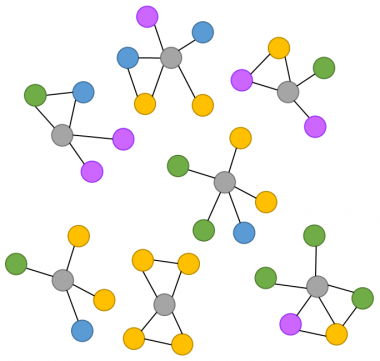
This projects investigates the role of social networks and social influence in travel behavior. Sustainable transportation programs may benefit from the incorporation of social influence through knowledge sharing, establishment of behavioral norms and peer-to-peer participation recruitment. The next phase of this ongoing research will involve evaluation of social influence as a tool in pilot sustainable transportation programs.
Social network theory recognizes that decisions are made in a social context, and social relationships may directly affect the costs and benefits of different choices. Recent research in the field of network science has demonstrated that social networks profoundly influence individual behavior ranging from political decisions (Klofstad, McClurg, and Rolfe 2009) to diet and exercise (Fowler and Christakis 2007). As in other behavioral research, how social networks affect behavior is becoming a central topic in travel behavior research and has important implications for transportation planning and the overall design of sustainable transportation policies.
Many travel demand management programs already incorporate various forms of social influence into their design. The UC Davis goClub periodically asks members to invite their friends and colleagues to sign up and pledge to use an alternative to driving alone for their commutes to campus. May is Bike Month, an annual month-long drive to increase bicycle commuting, utilizes social tools such as “challenge a friend” and “share your accomplishments” to instigate friendly competition among participants as they log bike miles during the event. Private operators also use social mechanisms to increase ridership; Amtrak offers a socially based discount. The “Take 5” campaign allows riders to purchase up to five $5 tickets with the purchase of one full-fare ticket to encourage groups to travel together by train along the California-based Capitol Corridor line. All of these programs incorporate social mechanisms to increase the use of alternative modes of transportation. Programs like these will benefit from a deeper understanding of how social influence affects travel behavior.
This project explores the influence of social networks on transportation mode choice and addresses changes in the effects of social influence depend related to how social networks are defined. Network connections may be explicitly social or defined by other relationships such as geographic neighborhoods; different types of relations may exert different types of social influence. How networks are defined also has implications for what is actually measured. The measurement of social influence is further complicated by the possibility that socially connected individuals make the same choices because of social influence, but also because they share environmental characteristics that impact their commute. This project also explores how the effect of social influence may be impacted by commute characteristics. For example, in the case of social influence on biking it is likely that individuals who have very long (or very short) commute distances are less affected by social influence; the differences between modes are more extreme, and the convenience of walking or driving is likely to take precedent over social influence.
